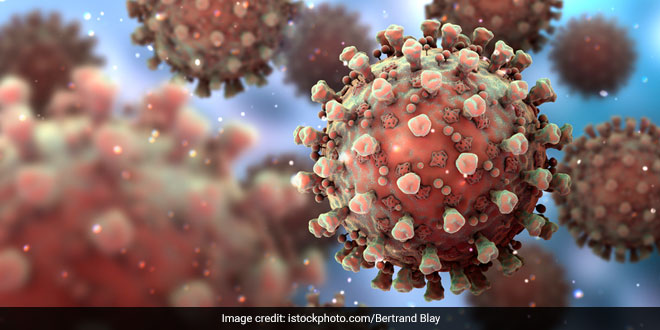Highlights
- UK variant nor B.1.617 associated with increased severity or death: Experts
- The UK strain is proven to have higher transmissibility: Experts
- The more the patients are infected, more will be the toll: IGIB Director
New Delhi: The ‘Indian strain’ of the coronavirus carries higher transmissibility similar to the UK variant, but there is little evidence so far of it being more lethal than the original virus, experts have said. The B.1.617 variant of SARS-CoV2, also being called a ‘double mutant’ or the ‘Indian strain’, has been found prevalent largely in Maharashtra and Delhi that have been severely hit by a devastating second wave of the pandemic.
Also Read: Second Wave Of Coronavirus: Countries Promise Medical Support To India Amid Rising COVID-19 Cases
In many cities in Maharashtra — the worst-hit state in the country — the B.1.617 variant was found in more than 50 per cent of samples on which genome sequencing was conducted, while the proportion of the UK variant was 28 per cent in the second week of March, Sujeet Singh, the Director of the National Centre for Disease Control, had said in a webinar on genome sequencing last week. The number of coronavirus cases has exploded in Delhi and Maharashtra over the last few weeks and crippled the healthcare sector.
Several hospitals in Delhi have reported an acute shortage of medical oxygen and are scrambling to save the lives of patients. Anurag Agrawal, the Director of the Institute of Genomics and Integrative Biology (IGIB), told PTI,
As far as we know, neither the UK variant nor this one (B.1.617) is associated with increased severity of illness or death. The UK strain is proven to have higher transmissibility and B.1.617 may have increased transmissibility. But this (that the B.1.617 variant has more transmissibility) has not been proven and there are several characterises to prove it and the studies have not been completed.
IGIB is one of the 10 laboratories spread across the country that are involved in genome sequencing of the virus. He, however, added that there is no comparison of which variant has increased transmissibility.
But looking at Maharashtra’s experience, it looks more transmissible, but it is yet to be proven. Looking at the general evidence, it (B.1.617) may be more transmissible, he said.
Also Read: “No Need To Panic”: AIIMS Chief, Top Doctors Clear Doubts About India’s COVID Surge
When asked about the increased deaths in the state in comparison to the first wave last year, Mr. Agrawal said this has direct relation with how transmissible the variant is. The more the patients are infected, the more will be the toll, he said.
The B.1.617 variant has three new spike protein mutations. Two mutations — E484Q and L452R — are in the area important for antibody-based neutralisation. The third mutation — P681R — allows the virus to enter cells a little better. These are defining characteristics of the variant.
Soumitra Das, the Director of the National Centre for Biological Sciences, said there is no report on the lethality of B.1.617 yet. NCBS in Kalyani in West Bengal is one of the 10 organisations involved in the genome sequencing of the coronavirus.
In a webinar on genome sequencing of the coronavirus last week, Soumitra Das had said variants found in India are not really escaping our vaccinated sera, suggesting that the available vaccines are effective on them. In its initial result on the efficacy of the Covishield vaccine, the Centre for Cellular and Molecular Biology, another premier institute that has been studying the virus, said the vaccine is effective against the B.1.617 strain.
Also Read: Study Reveals Mother-To-Newborn COVID-19 Infection Rates Are Low But Indirect Risks Exist
(Except for the headline, this story has not been edited by NDTV staff and is published from a syndicated feed.)
NDTV – Dettol Banega Swasth India campaign is an extension of the five-year-old Banega Swachh India initiative helmed by Campaign Ambassador Amitabh Bachchan. It aims to spread awareness about critical health issues facing the country. In wake of the current COVID-19 pandemic, the need for WASH (Water, Sanitation and Hygiene) is reaffirmed as handwashing is one of the ways to prevent Coronavirus infection and other diseases. The campaign highlights the importance of nutrition and healthcare for women and children to prevent maternal and child mortality, fight malnutrition, stunting, wasting, anaemia and disease prevention through vaccines. Importance of programmes like Public Distribution System (PDS), Mid-day Meal Scheme, POSHAN Abhiyan and the role of Aganwadis and ASHA workers are also covered. Only a Swachh or clean India where toilets are used and open defecation free (ODF) status achieved as part of the Swachh Bharat Abhiyan launched by Prime Minister Narendra Modi in 2014, can eradicate diseases like diahorrea and become a Swasth or healthy India. The campaign will continue to cover issues like air pollution, waste management, plastic ban, manual scavenging and sanitation workers and menstrual hygiene.
[corona_data_new]



















